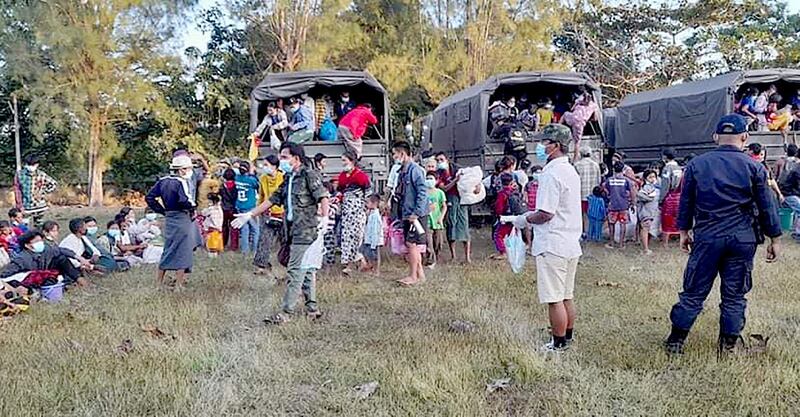Thailand is giving shelter to some 2,500 Burmese who fled from fighting between Myanmar junta forces and Karen rebels in Mae Htaw Thalay, a borderland village in Myawaddy township, Thai authorities said Friday.
The influx began on Thursday when around 700 Myanmar residents crossed into Mae Sot, a district in Tak province, followed by hundreds more on Friday morning, officials said. Some of the people fleeing from the fighting swam to the other side of the frontier across the narrow Moei River, the Tak Province Border Center said in statements issued Friday.
“[W]e found another 1,800 Myanmar people crossing to the Don Chai temporary shelter, lifting the number to 2,500 people,” a statement said, referring to a village 500 meters [546 yards] from Mae Htaw Thalay village on the Myanmar side of the border.
“We have provided the displaced people with basic treatment, foods and necessities, as well as discussion about their needs.”
Later, the displaced Burmese were moved to Mae Tao Klang School, about 3 miles from Don Chai, to comply with COVID-19 protocols.
Fighting between Myanmar’s military and a joint force of anti-junta fighters in territory controlled by a rebel Karen ethnic group forced all the 3,000 residents of Lay Kay Kaw township to flee, according to reporting by Radio Free Asia (RFA), with which BenarNews is affiliated.
The anti-junta fighters include the pro-democracy People’s Defense Force (PDF) militiamen and fighters with the Karen National Liberation Army, which is the armed wing of the Karen National Union (KNU) political group.
Since the Myanmar military seized power in a Feb. 1 coup that ousted the elected government of Aung San Suu Kyi, security forces in Myanmar have clashed with the PDF in various states.
In Lay Kay Kaw, the clashes began after government troops entered the area at least six times on Dec. 14 and captured more than 20 pro-democracy activists. They included a former member of parliament from the deposed National League for Democracy (NLD).
The clashes continued into Thursday near the village of Mae Htaw Thalay in Kayin’s Myawaddy township, forcing nearly all of nearby Lay Kay Kaw’s residents to leave the area, KNU town officials said.

Myanmar residents who fled amid clashes between Burmese junta troops and an ethnic Karen rebel group disembark from Thai military trucks before being processed in Mae Sot, Thailand, Dec. 16, 2021. [Third party via AFP]
On Thursday, a stray shell landed on the bank of the Moei River on the Thai side, but without causing any casualties, according to the Tak Province Border Center in Thailand.
This prompted the Naresuan Task Force to lodge a protest with the Township Border Committee, which comprises Burmese and Thai officials.
However, the “fighting between Myanmar troops and the ethnic Karen has not affected the livelihood of the Thai people,” the center said.
The Thai Ministry of Defense did not comment on the incident. An army spokesman said the displaced people would go back home when the fighting subsided.
Meanwhile, a Thai NGO said local authorities handled this latest Karen exodus better than the last one in March, when 2,300 displaced people made their way into Thailand.
Back then, Thai authorities had barred, or limited the number of non-governmental organizations providing aid to the displaced, said the Friends Without Borders Foundation, a local NGO.
“The Tak province handled the situation well and is well organized to set a new standard for short-term refugee treatment,” Pornsuk Kerdsawang, a member of the NGO, told BenarNews.
“Most importantly, [the province] must not hurriedly repatriate them because it may endanger their lives. When the situation is calm, they will go back home voluntarily.”
Thailand is not a signatory to the 1951 Refugee Convention, but has sheltered some 400,000 displaced Burmese during a past conflict in Myanmar.
Tanee Sangrat, spokesman for the Thai Ministry of Foreign Affairs, said the relevant “agencies have operational procedures based on humanitarian needs.”
Reported by BenarNews, an RFA-affiliated online news service.

